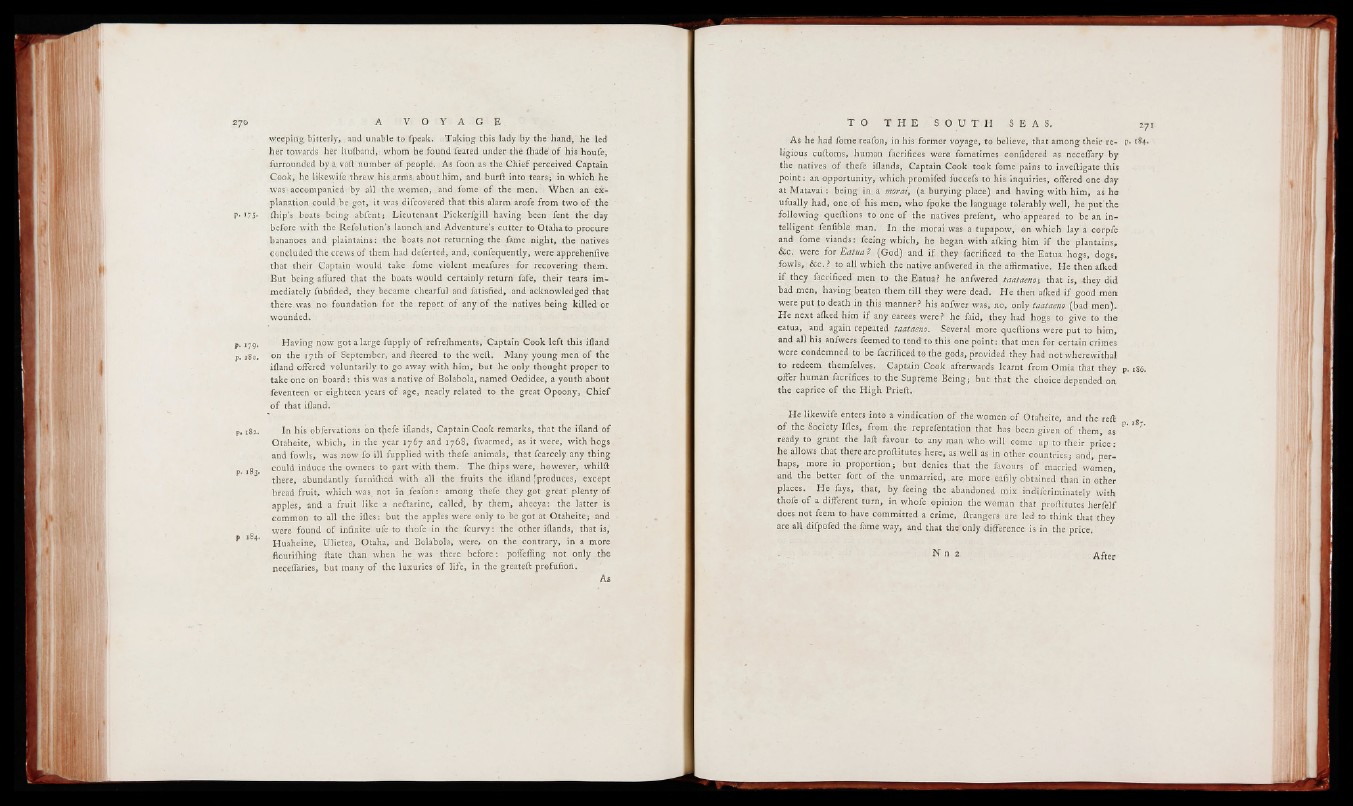
weeping bitterly, and unable to fpeak. Taking this lady by the hand, he led
her towards her huiband, whom he found feated under the ihade’ of his houfe,
furrounded by a vaft number of people. As foon as the Chief perceived Captain
Cook, he likewife threw his.arms about him, and burft into tears; in which he
was - accompanied by all the women, and fome of the men. When an explanation
could be got, it was difcovered that this alarm arofe from two of the
p* 175* ihip’s boats being abfent; Lieutenant Pickerfgill having been fent the day
before with the Refolution’s launch and Adventure’s cutter to Otahato procure
bananoes and plaintains : the boats not returning the fame night, the natives
concluded the crews, of them had deferted, and, confequently, were appreheniive
that their Captain would take fome violent meafures for recovering them.
But being allured that the boats would certainly return fafe, their tears immediately
fublided, they became chearful and fatisfied, and acknowledged that
there, was. no foundation for the report of any of the natives being killed or
wounded.
p. 179. Having now got a large fupply of refreihments, Captain Cook left this iiland
p. 180. on the 17th of September, and fteered to the weft. Many young men of the
iiland offered voluntarily to go away with him, but he only thought proper to
take one on board: this was a native of Bolabola, named Oedidee, a youth about
feventeen or eighteen years of age, nearly related to the great Opoony, Chief
o f that iiland.
p. 182. In his obfervations bn tjiefe iilands, Captain Cook remarks, that the iiland of
Otaheite, which, in the year 1767 and 1768, fwarmed, as it were, with hogs
and fowls, was now fo ill fupplied with thefe animals; that fcarcely any thing
p could induce the owners to part with them. The ihips were, however, whilft
there, abundantly furniftied with all the fruits the iiland [produces, except
bread fruit, which was^ not in .feafon: among thefe they got great' plenty of
apples, and a fruit like a nedtarine, called, by them, aheeya: the latter is
common to all the iiles: but the apples were only to be got at Otaheite; and
were found of infinite ufe to thofe in the fcurvy: the other iilarids, that is,
p 1 4‘ Huaheine, Ulietea, Otaha, and Bolabola, were> on the contrary, in a more
flouriihing ftate than when he was there before: poffeifing not only -the
neceffaries, but many of the luxuries of life, in the greateft profufioii.
As he had ibme reafon, in his'former voyage, to believe, that among their re- p* 184.
ligious cuftoms, human facrifices were fometimes confidered as neceffary by
the. natives, of thefe iilands, Captain Cook took fome pains to inveftigate this
point: an opportunity, which promifed fuccefs to his inquiries, offered one day
at Matavai: being in. a morai, (a burying place) and having with him, as he
ufually had, one. of his men, who fpoke the language tolerably well, he put the
following queftions to one of the natives prefent, who appeared to be an intelligent
fenfible man. In the morai was a tupapow, on which lay a corpfe
and fome viands: feeing which, he began with aiking him i f the plantains,
&c. were for Eatua 2 (God) and i f they facrificed to the Eatua hogs, dogs,
fowls,; &c.? to all which the native anfwered in the affirmative. He then aiked
if they facrificed men to the Eatua? he anfwered taataeno; that is, -they did
bad men, haying beaten them till they were dead. He then aiked i f good men.
were put to death in this manner? his anfwer was, no, only taataeno (bad men).
He next aiked him i f any earees were? he faid, they had hogs to give to the
eatua, and again repeated taataeno. Several more queftions were put to him,
and all his anfwers feemed to tend to this one point: that men for certain crimes
were condemned to be facrificed to the gods, provided they had not wherewithal
to redeem themfelves. Captain Cook afterwards learnt from Omia that they p. 186.
offer human facrifices to the Supreme Being; but that the choice depended on
the caprice of the High Prieft.
He likewife enters into a vindication of the women of Otaheite, and the reft
of the Society Iiles, from the reprefentation that has been given of them, as P* 1 7*
ready to grant the laft favour to any man who will come up to their price :
he allows that there areproftitutes here, as well as in other countries; and, perhaps,
more in proportion; but denies that the favours of married women,
and the better fort of the unmarried,.are more eafily obtained than in other
places. He fays, that, by feeing the abandoned mix indiicriminately with
thofe of a different turn, in whofe opinion the woman that proftitutes herielf
does not feem to have committed a crime, ftrangers are led to think that they
are all difpofed the fame way, and that the only difference is in the price.'
N n 2 After